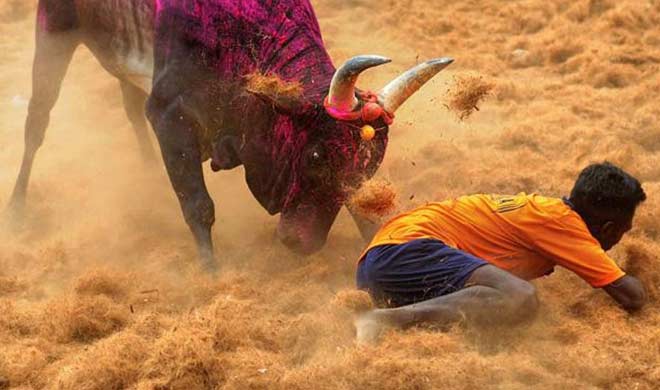
When Tamil Nadu’s Jallikattu law sought to protect animals from “unnecessary pain” while also preserving the “culture and traditions” of the State’s residents, the Supreme Court queried activists about what they perceived as its shortcomings.
The News
- People’s culture and customs are now recognised as a fundamental right under the Prevention of Cruelty to Animals (TN Amendment) Act of 2017 and the Prevention of Cruelty to Animals (Conduct of Jallikattu) Rules of 2017.
- The petitioners claimed that an assertion does not grant the status of a fundamental right to a simple action.
- It discussed how customs like sati, dowry, widow remarriage, child marriage, etc. were once acknowledged as being essential to our culture and were put an end to by law.
Jallikattu
- It is a controversial traditional event in which a bull is let loose among a crowd of spectators as part of a bull-taming sport.
- The bull tries to escape while other human participants try to grab the huge hump on its back with both arms and hang on to it.
- In an effort to halt the bull, participants hold the hump for as long as they can. Occasionally, riders are required to ride far enough to remove flags from the bull’s horns.
- It is commonly practised as part of the Pongal (harvest) celebrations in January in the state of Tamil Nadu.
Problems
- The Animal Welfare Board of India’s inquiry revealed that “Jallikattu is intrinsically harsh to animals.”
- Human fatalities: A number of people have been killed or injured as a result of the incident, and there have also been multiple bull deaths.
- Animal abuse: Bull handling before release as well as during the competitor’s efforts to control the bull raises questions about animal welfare.
- Animal intoxication: There are also instances of bulls being forced to consume alcohol in order to make them disoriented, or of bulls being agitated by rubbing hot peppers in their eyes.
Supporting Arguments
- Native breed conservation: Its proponents claim that it is not a recreational activity but rather a strategy to support and protect the local livestock.
- Sangam manuscripts make reference to jallikattu, which was known to be practised during the Tamil classical period (400–100 BCE).
- Some people think that the sport also represents a friendly man-animal relationship.
